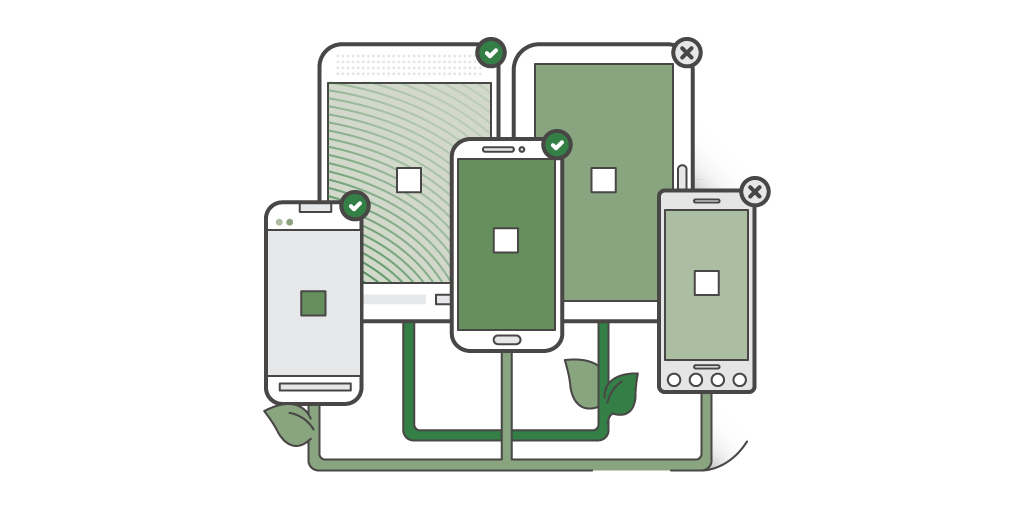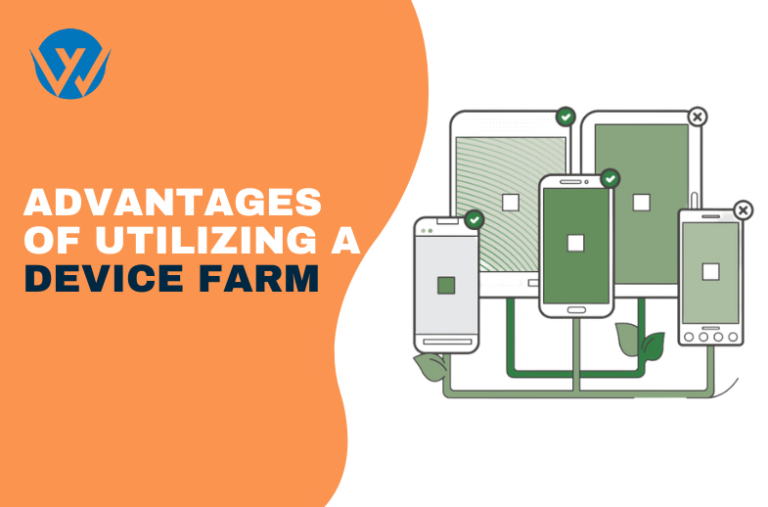Today, the smartphone market is experiencing significant disruption due to innovative applications with a large user base. The extensive customization and parameterization within the Android ecosystem have increased app usage but also exacerbated fragmentation issues.
Device farms have emerged as an effective solution for testing apps across this fragmented landscape. They provide access to real devices and web browsers via the cloud, enabling testers to identify both functional and non-functional errors without the need for physical lab infrastructure.
What is a Device Farm?
QA engineers and analysts perform tests on real devices to ensure the quality and reliability of mobile and software products. To test applications on different devices and configurations, one would need to own a variety of devices. This involves not only purchasing multiple devices but also running automated tests, installing builds, and continuously monitoring each device, which can be time-consuming and impractical. The solution to this challenge is a device farm.

These platforms support testing across different configurations, environments, operating systems, and device types. By using device farms, developers can identify issues related to functionality, compatibility, performance, and design by observing how their products perform from the end-users’ perspective.
Device farms also enable developers to test their applications under common hardware conditions, such as low battery, varying CPU usage, network strength, and interruptions like incoming calls or texts. Additionally, developers can interact with the devices using gestures, fingerprints, or FaceID to ensure the responsive design of their apps is stable and fully functional.
In summary, device farms eliminate the need for guesswork in testing strategies by allowing code to be run on actual devices, providing precise performance data. This leads to significant time and resource savings, thereby enhancing the efficiency and effectiveness of the development process.
How Have Device Farms Transformed the Testing Landscape?
The emergence of real device clouds has revolutionized the software testing landscape, making testing faster, easier, and more precise. Quality Assurance (QA) teams no longer need to speculate about potential bugs; they can directly observe their applications in real-world conditions.
Device farms provide developers with access to the actual devices on which their apps and websites will run. Instead of guessing potential issues, QA testers can execute their code on real devices and obtain accurate results. This allows them to see how their applications behave under various conditions, such as low battery, offline modes, or weak network signals. They can also interact with mobile devices using gestures and other inputs through their web browsers to verify the stability of the app’s responsive design.
Access to real devices enables developers to test both native and hybrid apps across a wide range of desktop and mobile devices, ensuring broad compatibility and optimal performance. This extensive testing capability ensures that apps can effectively serve a large and diverse customer base.
For smaller companies, creating and maintaining an in-house device lab can be costly and labor-intensive. Device farms, maintained by specialized organizations, offer an easier and more cost-effective solution. These farms continuously update their device inventories to include the latest devices, browsers, and operating systems, saving companies the hassle and expense of keeping their labs current.
Individual developers also benefit from device farms and real device clouds, as they provide a cost-effective way to test the real user experiences of their applications across multiple devices. These platforms allow developers to initiate testing from any location at any time, reducing the worry about ensuring app efficacy without the backing of a large corporation.
Additionally, many device farms offer parallel testing for automated test scripts, allowing tests to be executed on multiple devices simultaneously. This capability significantly reduces testing time, provides accurate results, and speeds up the debugging process. This feature is especially advantageous for agile teams aiming to release bug-free products within tight deadlines.
Device Farm Types
A device farm is a platform or service that lets developers test apps on several real devices, making sure apps work well across various hardware configurations, operating systems, and device settings. The following are the main kinds of device farms:
Physical Device Farms
Real, network-connected devices that can be accessed and tested remotely make up physical device farms. Although they offer the most accurate representation of actual usage, they can be expensive to maintain. These farms are crucial for assessing features exclusive to certain hardware and confirming compatibility with a range of physical devices.
Virtual Device Farms
Virtual machines are used in virtual device farms to simulate real devices. They are less expensive and more scalable, but they don’t always faithfully mimic actual circumstances. Virtual devices are useful for both initial and regression testing since they provide a rapid and efficient way to test apps in various environments.
Cloud-based Device Farms
Cloud-based device farms combine the benefits of both physical and virtual farms by hosting a large number of devices in the cloud. Because they enable engineers to do tests on various devices without requiring real gear, these farms are an excellent method to expedite testing processes. One well-known cloud-based device farm is LambdaTest.
With over 3000 real devices, browsers, and OS combinations supported, LambdaTest is an AI-powered platform for test orchestration and execution that facilitates both manual and automation testing at scale. By giving developers access to a large range of real devices, virtual computers, and operating systems, it enables developers to test their apps rapidly and in many scenarios.
iOS and Android Device Farms
iOS Device Farm
Mobile app testing may be made much more efficient by employing an iOS device farm. To guarantee smooth app performance across many iPhones and iPads, developers and testers can utilize an iOS device farm, which is a collection of iOS devices. With the increasing variety of iOS devices, this strategy is crucial.
Benefits of Using a Device Farm for iOS
Diverse Testing Environment: Having access to a large selection of iOS devices, including the newest models with different screen sizes, makes it easier to find compatibility problems unique to individual devices.
Real-world Testing: By taking into account variances in hardware and software that may affect app performance, testing on genuine iOS devices replicates the real user experience.
An Android Device Farm’s Significance in App Development
Because of the variety of Android versions, screen sizes, and devices, an Android device farm is necessary for app development. A consistent and ideal user experience is ensured by thorough testing across these criteria.
- Advantages of Using an Android Device Farm for Handling Platform Fragmentation: An Android device farm makes it possible to handle platform fragmentation efficiently. Through cross-device testing, developers are able to find and address problems unique to particular configurations of devices.
- Better User Experience: Making sure the app functions well on a range of Android smartphones boosts user happiness and lowers the possibility of unfavorable reviews because of issues with individual devices.
Benefits of Using a Device Farm
Using a device farm offers numerous advantages for testing and software development. Here are the key benefits:
Access to a Wide Range of Devices
- Variety: This variety ensures that apps run correctly on the full range of end-user devices.
- Real Devices: Testing on real devices yields more accurate results than emulator testing, as emulators often miss the nuances of actual device performance.
Improved Test Coverage
- Broad Coverage: Access to numerous devices significantly improves test coverage. This ensures that apps are tested across various scenarios, helping to identify and fix problems that may arise on specific devices or configurations.
- Geographic and Network Variability: Device farms enable testing under different network and geographic conditions, providing insights into performance and functionality in varied settings.
Time Efficiency
- Quick Setup: Setting up a testing environment with a device farm is typically faster than acquiring and configuring physical devices internally.
- Faster Testing Cycles: On-demand access to multiple devices and parallel testing significantly reduces the time required for comprehensive testing.
Security and Compliance
- Data Security: Reputable device farms offer robust security measures to protect the applications and data being tested.
- Compliance: Device farms can help meet regulatory requirements for testing apps under various conditions and on different types of devices.
Environment Consistency
- Standardized Testing Environment: Device farms provide a consistent and controlled testing environment, reducing variability and aiding in problem reproduction and debugging.
- Elimination of External Factors: Device farms isolate the testing process from local environmental variables, ensuring consistent and reliable test results.
Integration with Development Tools
- Seamless Integration: Device farms often integrate smoothly with popular testing and development tools like Appium, Jenkins, Selenium, and JIRA, streamlining test management and execution.
- Unified Dashboard: Many device farms offer a unified dashboard for viewing results, tracking test progress, and accessing records, which improves efficiency and collaboration.
Leading Device Farms for Mobile App Testing
Device farms fundamentally use scripts executed by the operating system to simulate user interactions like gestures, button presses, and touches. The primary differences among device farms lie in the subsystems they use to run these scripts.
LambdaTest
LambdaTest is an AI-powered platform that offers a comprehensive online device farm with features designed to enhance your testing process:
- Simulating Real-World Scenarios: LambdaTest allows you to replicate user interactions under various conditions, such as different network speeds and battery levels, ensuring thorough testing.
- Native Developer Tools Integration: Utilize integrated native developer tools within LambdaTest’s device farm, streamlining testing and debugging for your mobile apps.
- Easy File Uploads: Effortlessly upload files in formats like txt, PDF, doc, and xls via cloud services like Google Drive, enabling easy remote access to necessary resources.
- Testing Locally Hosted Apps: Test locally hosted apps and websites to identify and fix issues in development environments, preventing potential bugs post-deployment.
AWS Device Farm
AWS Device Farm is known for its extensive capabilities, allowing concurrent testing on multiple devices and providing comprehensive logs and videos for debugging:
- Diverse Device Options: Customize device specifications such as memory, CPU usage, and location.
- Video and Log Generation: Generate detailed logs and videos to expedite bug reproduction and resolution.
- Real-World Environment Simulation: Adjust settings like location, network, and language to fine-tune testing environments.
- CI/CD Pipeline Integration: Integrate with various CI/CD tools, including Jenkins and Android Studio, via plugins and APIs.
Private Device Labs: Avoid long wait times by provisioning private device labs
Support for Multiple Frameworks: Execute scripts using frameworks like Appium (iOS and Android), Espresso, Robotium (Android), and UIAutomation and XCTest (iOS).
Firebase Test Lab
Developed by Google, Firebase Test Lab specializes in Android app testing and supports iOS apps as well. It uses real devices in Google data centers and offers seamless integration with development tools:
Locale Customization: Customize locale settings and access updated APIs
- Integration with Development Tools: Easily integrate with Android Studio, Firebase console, and gCloud CLI for streamlined CI pipeline integration.
Xamarin Test Cloud
Part of Microsoft’s Visual Studio App Center, Xamarin Test Cloud offers testing on over 2500 mobile devices:
- Support for Multiple Frameworks: Use frameworks like Appium, Calabash, Espresso, and Xamarin.UITest.
- Automated Test Execution: Automate test execution and receive detailed reports.
Kobiton
Kobiton provides access to hundreds of real devices in the cloud, emulating real-world performance:
- Detailed Test Logs: Generate detailed logs for efficient debugging.
- Parallel Execution: Conduct tests in parallel for faster results.
- CI/CD Integration: Seamlessly integrate with CI/CD pipelines to streamline the testing process.
- Security Focus: Prioritize security during testing, ensuring robust protection across devices.
Final Thoughts
The advent of device farms has transformed the testing realm, providing testers with improved access to test devices and yielding quicker, more precise, and dependable outcomes. Prior to their emergence, testers faced considerable challenges in identifying performance issues and determining the optimal mix of devices, browsers, and operating systems for testing purposes.
Though virtual devices, simulations, and emulations have propelled testing forward, device farms signify a fundamental change, allowing businesses to carry out tests in genuine environments even without an extensive inventory of physical devices.

